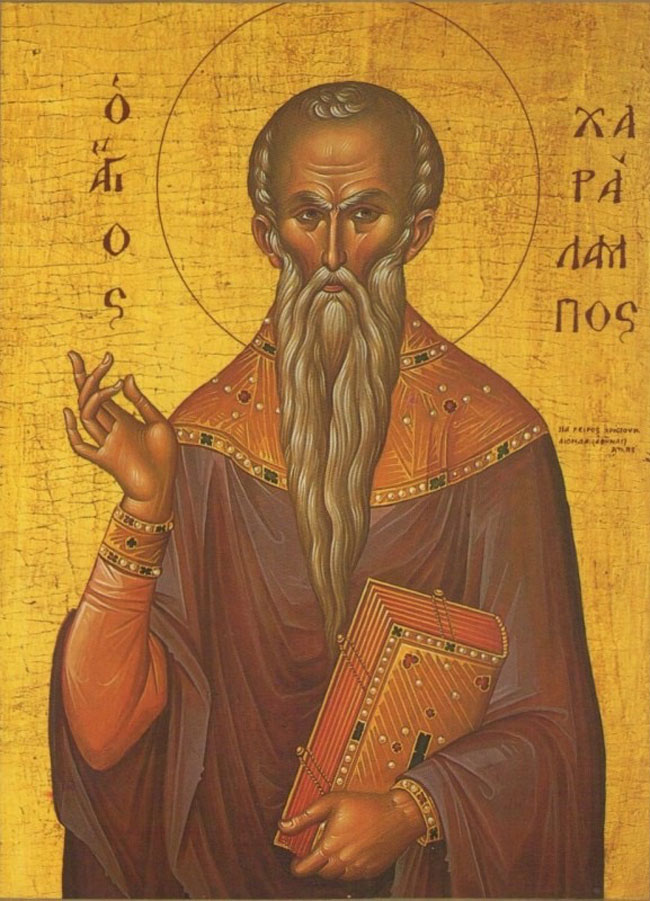
From today we enter the Triodion, during which the Church prepares us for the coming spiritual struggle of Great Lent. With the devotions, services and readings of this period, we are given what we need to acquire the virtues of obedience, illumination, true faith and love. All of these virtues can be seen in the life of St. Haralambos, whose memory we celebrate beginning with today’s Vespers.
St. Haralambos was born in Magnesia, Asia Minor (near Ephesus) in 89 AD. St. John the Apostle and Evangelist was living in Ephesus at the same time. It was during this blessed period of the Apostolic Fathers (the successors of the Holy Apostles) that St. Haralambos lived, reaching the age of 113 before his martyrdom in 202 AD. He demonstrated his worthiness to receive the grace of priesthood through the sanctity of his life and apostolic zeal, bringing many pagans to Christ in his homeland of Magnesia. This activity became known to the pagan Governor of Magnesia, and St. Haralambos was arrested in 202 during the persecutions against Christians enacted by the Emperor Septimius Severus.
The governor subjected the Saint to horrific tortures in order to compel the elderly priest to deny Christ. He faced them all with faith, trust in God, patience, humility and forgiveness towards his tormentors. During these trials, miracles were taking place: the blind regained sight, the lame were walking, people were healed from their diseases and demons were cast out of the possessed. Seeing all of this, some asked St. Haralambos, “Are you the Christ?” The Saint responded with simplicity: “I am the servant of the Lord Christ, and by His grace these wonders are done.” When the Emperor heard of this, he said to the Saint: “I heard you can resurrect the dead.” To which St. Haralambos replied: “This is something only the Lord Christ can do, and not man.”
This is an important point to emphasize, in that humility is the basis of holiness. We feel as a servant of God, and to give Him the glory for any good that we may do. "Not to us, O Lord, not to us, But to Your name give glory (Psalm 113 [114]: 9), as the Psalmist says. This humble spirit characterized the Apostles of Christ. Let us remember the reaction of Sts. Paul and Barnabas, when after the miraculous healing of the man crippled from birth, were pressed by the people who wanted to worship them as gods! The Holy Apostles "tore their clothes and ran in among the multitude, crying out and saying: ‘Men, why are you doing these things? We also are men with the same nature as you ... turn to the true God" (Acts 14:14-15).
It is absurd to ask for God’s help and then when He gives it, present it to others as our own achievements. This is ingratitude to God and a usurpation of His power and glory. Unfortunately, this is all too easy after some great success, where a person forgets God and takes credit for the blessing they have received. In such a proud person, St. Paul asks the question: "What do you have that you did not receive? Now if you did indeed receive it, why do you boast as if you had not received it?" (1 Corinthians 4:7).
Such selfishness offends God, and has devastating consequences for the person who acts in such a way. We see this in the case of Herod. Herod, as we read in the Acts of the Apostles (12:21-23), dressed in brilliant royal costume, and spoke to his people in such a way that the people were captivated and cheered: "The voice of a god, not of a man!" What happened? Because he accepted this praise and did not honor God, he was eaten by worms and died (see Acts 12:23). Let us remember the example of wicked Herod when the temptation comes to be proud of the praise of others or boast of our successes, and instead give honor and glory to God.
Of course, this does not meant a Christian cannot be pleased or feel happy about an achievement in life, with effort or struggle. The student will be happy about academic success, the scientist in their discoveries, and the professional for a good career. There will be rejoicing, but the Christian will not fail to give thanks to God for such blessings. The motivation is not personal satisfaction or selfish gratification, but their soul and the glory of God. This is exactly what St. Paul the Apostle urges us to do: "Whatever you do, do all to the glory of God." (1 Corinthians 10:31).
Dear brothers and sisters, let us all understand where selfishness and pride leads us, in contradiction with God and our neighbors, as we saw in today’s Parable of the Publican and the Pharisee. It is in our great interest to live in humility. St. Haralambos is our model! In this we can ensure that there is peace of the soul, harmony with others, and the rich grace of God working in our lives, since "God resists the proud, but gives Grace to the humble " (James 4:6).





